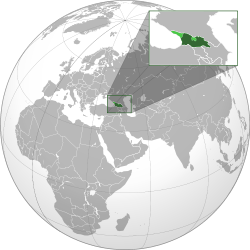Georgia: Growing Outrage Over Prison Torture
By IWPR
By Teo Bichikashvili
Georgia’s parliamentary election race has been thrown wide open by graphic film footage of prisoners being abused in jail, which has done serious damaging the ruling party’s chances of victory.
The video footage, which some are calling “Georgia’s Abu Ghraib”, was broadcast on opposition-leaning television channels on September 18. It showed prisoners being beaten and sexually assaulted in the Gldani Prison.
Thousands of people took to the streets of the capital Tbilisi this week to express their anger at the brutality, and the government is struggling to regain the initiative before the October 1 election.

“What we saw in the pictures was sickening. The government and the president personally must answer for it,” Nino Kvaratskhelia, one of demonstrators in Tbilisi, said. “A government which has allowed this to happen in prisons must be held to account,”
President Mikheil Saakashvili expressed his shock and revulsion at the prison abuse in a special video message.
“Everyone who organised or implemented of this, whoever did this and whoever allowed it, deserves the harshest punishment,” he said.
Interior Minister Bacho Akhalaia resigned, saying he felt he bore a moral responsibility for these “horrible practices”.
Akhalaia’s resignation had been one of the demands heard during the protests this week. He had been head of Georgia’s penitentiary system from 2005 to 2008, and was accused by rights activists of allowing torture.
The minister responsible for prisons, Khatuna Kalmakhedlidze, also resigned, but the wave of anger continued.
“The government must take full responsibility for what has happened. A few ministers resigning is not enough – the government must resign,” theatre director Avto Varsimashvili said.
Since the footage came to light, a dozen prison staff have been arrested and charged with treating inmates inhumanely.
At the same time, an arrest warrant has been issued for Vladimer Bedukadze, the former guard at the Gldani prison who handed the video material over to journalists. The interior minister has accused Bedukadze of filming torture scenes in return for payment from Tamaz Tamazashvili, a prisoner in the jail whose has a son and son-in-law running for election, representing the opposition Georgian Dream coalition which is headed by billionaire Bidzina Ivanishvili.
Since Tamazashvili is incarcerated, he was not available to comment on the matter, but Bedukadze – now in Brussels – denied the allegation.
“In May, I told myself that either I was a servant of the regime or I was a man. I wrote a letter of resignation, and I took the video I’d filmed and quietly left the country,” he told Russia Today television. “I was scared I’d be eliminated… so I sought political asylum in Belgium.”
Some observers noted that some of the footage dates from last year, and some could be older that that, so the timing of its release so close to a crucial election looks deliberate.
The scandal has certainly done serious damage to the ratings of Saakashvili’s United National Movement, UNM, and given a corresponding boost to opposition groups including Georgian Dream.
The government is trying to calm the public anger and look for a way out.
Goga Khachidze, a former environment minister and UNM member, appeared on opposition television channels to promise that high-ranking officials would be arrested.
Giorgi Tugushi, formerly the national ombudsman for human rights, has been appointed prisons minister. He has previously delivered strong criticism of the situation in the penal system.
Despite these actions, political analysts are now questioning whether the government has time to limit the damage the videos have done before election day.
Many protesters, however, have been at pains to stress that their actions are not in support of any party, and that they deliberately avoided political symbols and banners.
“I don’t take part in politics, but it’s absolutely unacceptable for such things to have happened to prisoners,” Rusudan Petviashvili, a famous Georgian artist, said.
Gega, a 19-year-old university student in Tbilisi, said, “We came onto the streets to register our protest against the inhuman treatment of people and crimes against our fellow-citizens, not in support of any particular party. What has happened must not go unpunished.”
Teo Bichikashvili is a freelance journalist in Georgia. This article was published at IWPR’s CRS Issue 659.

We lost the taste for such balanced and non partisans articles, thank you Teo Bichikashvili.
If this was Ukraine the “West” would be after the presidents head, but Mikheil Saakashvili is a “friend” who does NATO’s bidding. Ergo, he is not subjected to the same standard as applies to Viktor Yanukovych who has learned at least one thing while in office; that is to put HIS country FIRST and ALL others afterwards.